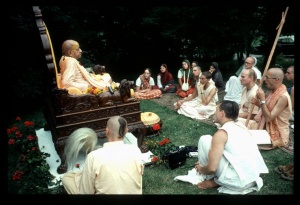CC Madhya 18.189: Difference between revisions
m (1 revision(s)) |
No edit summary |
||
| Line 1: | Line 1: | ||
{{ | [[Category:Sri Caitanya-caritamrta - Madhya-lila Chapter 18|C189]] | ||
<div style="float:left">'''[[Sri Caitanya-caritamrta|Śrī Caitanya-caritāmṛta]] - [[CC Madhya|Madhya-līlā]] - [[CC Madhya 18|Chapter 18: Lord Śrī Caitanya Mahāprabhu's Visit to Śrī Vṛndāvana]]'''</div> | |||
<div style="float:right">[[File:Go-previous.png|link=CC Madhya 18.188|Madhya-līlā 18.188]] '''[[CC Madhya 18.188|Madhya-līlā 18.188]] - [[CC Madhya 18.190|Madhya-līlā 18.190]]''' [[File:Go-next.png|link=CC Madhya 18.190|Madhya-līlā 18.190]]</div> | |||
{{CompareVersions|CC|Madhya 18.189|CC 1975|CC 1996}} | |||
{{RandomImage}} | |||
==== TEXT 189 ==== | ==== TEXT 189 ==== | ||
<div | <div class="verse"> | ||
prabhu kahe,—tomāra śāstra sthāpe ‘nirviśeṣe’ | :prabhu kahe,—tomāra śāstra sthāpe ‘nirviśeṣe’ | ||
tāhā khaṇḍi’ ‘saviśeṣa’ sthāpiyāche śeṣe | :tāhā khaṇḍi’ ‘saviśeṣa’ sthāpiyāche śeṣe | ||
</div> | </div> | ||
| Line 12: | Line 16: | ||
==== SYNONYMS ==== | ==== SYNONYMS ==== | ||
<div | <div class="synonyms"> | ||
prabhu | ''prabhu kahe''—Śrī Caitanya Mahāprabhu continued to speak; ''tomāra śāstra''—your scripture (the Koran); ''sthāpe''—establishes; ''nirviśeṣe''—impersonalism; ''tāhā khaṇḍi’''—refuting that; ''sa-viśeṣa''—personal God; ''sthāpiyāche''—established; ''śeṣe''—at the end. | ||
</div> | </div> | ||
| Line 19: | Line 23: | ||
==== TRANSLATION ==== | ==== TRANSLATION ==== | ||
<div | <div class="translation"> | ||
Śrī Caitanya Mahāprabhu said, “The Koran certainly establishes impersonalism, but at the end it refutes that impersonalism and establishes the personal God. | Śrī Caitanya Mahāprabhu said, “The Koran certainly establishes impersonalism, but at the end it refutes that impersonalism and establishes the personal God. | ||
</div> | </div> | ||
__NOTOC__ | |||
<div style="float:right; clear:both;">[[File:Go-previous.png|link=CC Madhya 18.188|Madhya-līlā 18.188]] '''[[CC Madhya 18.188|Madhya-līlā 18.188]] - [[CC Madhya 18.190|Madhya-līlā 18.190]]''' [[File:Go-next.png|link=CC Madhya 18.190|Madhya-līlā 18.190]]</div> | |||
__NOTOC__ | |||
__NOEDITSECTION__ | |||
Revision as of 06:11, 1 September 2021
Śrī Caitanya-caritāmṛta - Madhya-līlā - Chapter 18: Lord Śrī Caitanya Mahāprabhu's Visit to Śrī Vṛndāvana

His Divine Grace
A.C. Bhaktivedanta Swami Prabhupada
A.C. Bhaktivedanta Swami Prabhupada
TEXT 189
- prabhu kahe,—tomāra śāstra sthāpe ‘nirviśeṣe’
- tāhā khaṇḍi’ ‘saviśeṣa’ sthāpiyāche śeṣe
SYNONYMS
prabhu kahe—Śrī Caitanya Mahāprabhu continued to speak; tomāra śāstra—your scripture (the Koran); sthāpe—establishes; nirviśeṣe—impersonalism; tāhā khaṇḍi’—refuting that; sa-viśeṣa—personal God; sthāpiyāche—established; śeṣe—at the end.
TRANSLATION
Śrī Caitanya Mahāprabhu said, “The Koran certainly establishes impersonalism, but at the end it refutes that impersonalism and establishes the personal God.